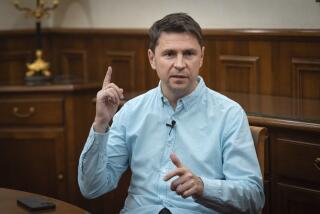Russia Won’t Budge on Iran Nuclear Deal
- Share via
MOSCOW — Russia on Monday flatly refused a plea by Defense Secretary William J. Perry to call off a $1-billion deal to sell nuclear reactors to Iran, and Kremlin officials also warned that arms control is at stake if Eastern European states are allowed to join NATO.
The setbacks for U.S. policy toward Russia came despite Perry’s announcement that $50 million more in disarmament aid is on the way and his assurances that high-level contacts and help with defense conversion should not be endangered by disagreements.
But even after a personal appeal for an annulment of the Iranian nuclear pact on the grounds it might undermine regional security, Perry was told by Russian Prime Minister Viktor S. Chernomyrdin that the sale will go through.
“I expressed my deep concern about Russia selling nuclear reactors to Iran,” Perry said after a day replete with contentious meetings. “I was fearful that this would fuel Iran’s ambition of becoming a nuclear weapons state--and that would be a threat to all of the neighbors, including Russia.”
Perry said he had offered to share U.S. information supporting its concerns that Iran is trying to build nuclear weapons but that “the Russian government did not agree to change their position to proceed with that sale.”
Chernomyrdin told Perry that Russia is confident it can ensure that the reactors are not used to make weapons-grade plutonium.
“I told him I did not share that confidence,” Perry said, adding that he is suspicious of the deal because Iran is “awash in oil” and hardly needs expensive nuclear technology to generate power.
Russia’s minister for atomic energy, Viktor N. Mikhailov, on Sunday accused the United States of opposing the Iranian deal in an attempt to monopolize the civilian nuclear market.
“The United States controlled the market for 40 years,” Mikhailov said in a television interview. “Now no one wants us to earn money too.”
The minister, who sat in on Perry’s talks with Chernomyrdin, said the Iran contract would be negotiable only if Washington agreed to reimburse Moscow for the lost revenue. Perry said there was no discussion of U.S. compensation.
Although his weeklong visit to Russia, Ukraine, Kazakhstan and Uzbekistan was intended as a scouting trip for U.S. joint ventures to help convert defense plants to civilian production, the Iran dispute dominated Perry’s Moscow agenda.
President Clinton had earlier hinted that he might boycott May 9 celebrations of the Allies’ World War II victory over Nazi Germany 50 years ago unless Moscow scrapped the Iranian deal and ceased its bloody attacks on separatists in the southern republic of Chechnya.
*
Perry conceded that he made little progress on either front. But he said he supported Clinton’s intention to take part in the war commemoration and a two-day summit with Russian President Boris N. Yeltsin as events too important to be made contingent on complete harmony between the two states.
“It’s not good policy of the United States to suspend relations, even if we are having disagreements, serious disagreements,” Perry said in defending Clinton’s decision to visit next month.
In another display of the tough line Moscow has been taking toward Washington in recent weeks, Defense Minister Pavel S. Grachev warned that Russia might react to any expansion of the North Atlantic Treaty Organization by ignoring treaty limitations on the numbers of troops and tanks deployed in the country.
Grachev told reporters after an hourlong one-on-one meeting with Perry that the curbs on conventional arms “should not apply to areas of combat,” a hint that a retaliatory buildup would likely be directed against Chechnya.
NATO discussions of expanding to embrace reform-oriented states in Eastern Europe have angered Russian officials, who fear that erstwhile allies are being drawn into rival security and economic blocs.
Asked what recourse Russia would have in the event NATO extends membership to Hungary, Poland or the Czech Republic, as the countries have requested, Grachev warned that “countermeasures would be taken.”
“We would not abide by the Conventional Forces in Europe Treaty, and we might create necessary military groups” and alliances with other former Soviet republics, Grachev said, alluding to a defense approach similar to the defunct Warsaw Pact that was NATO’s Cold War enemy.
Perry responded to Grachev’s warning by noting that expansion of the 16-nation NATO would be so logistically complicated that it is unlikely to be an issue any time soon.
Despite the wide-ranging difficulties, Perry concluded his Moscow meetings by signing a $20-million aid program for expediting the destruction of Russia’s offensive nuclear weapons, as well as $10 million for employing nuclear scientists in civilian production, $17 million for transport to Russia of nuclear warheads from other former Soviet republics and $3 million for upgrading storage facilities for those returned arms.
More to Read
Sign up for Essential California
The most important California stories and recommendations in your inbox every morning.
You may occasionally receive promotional content from the Los Angeles Times.














